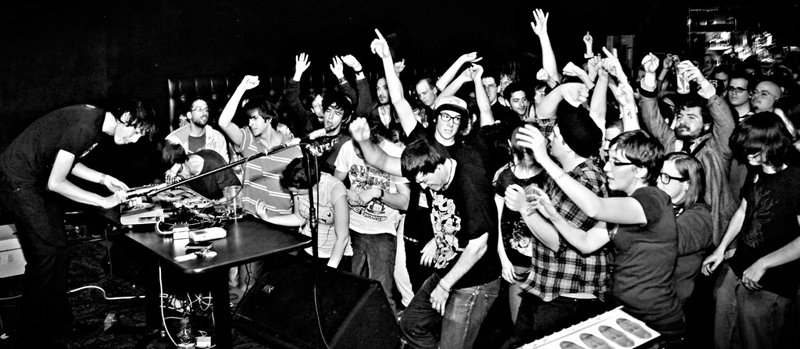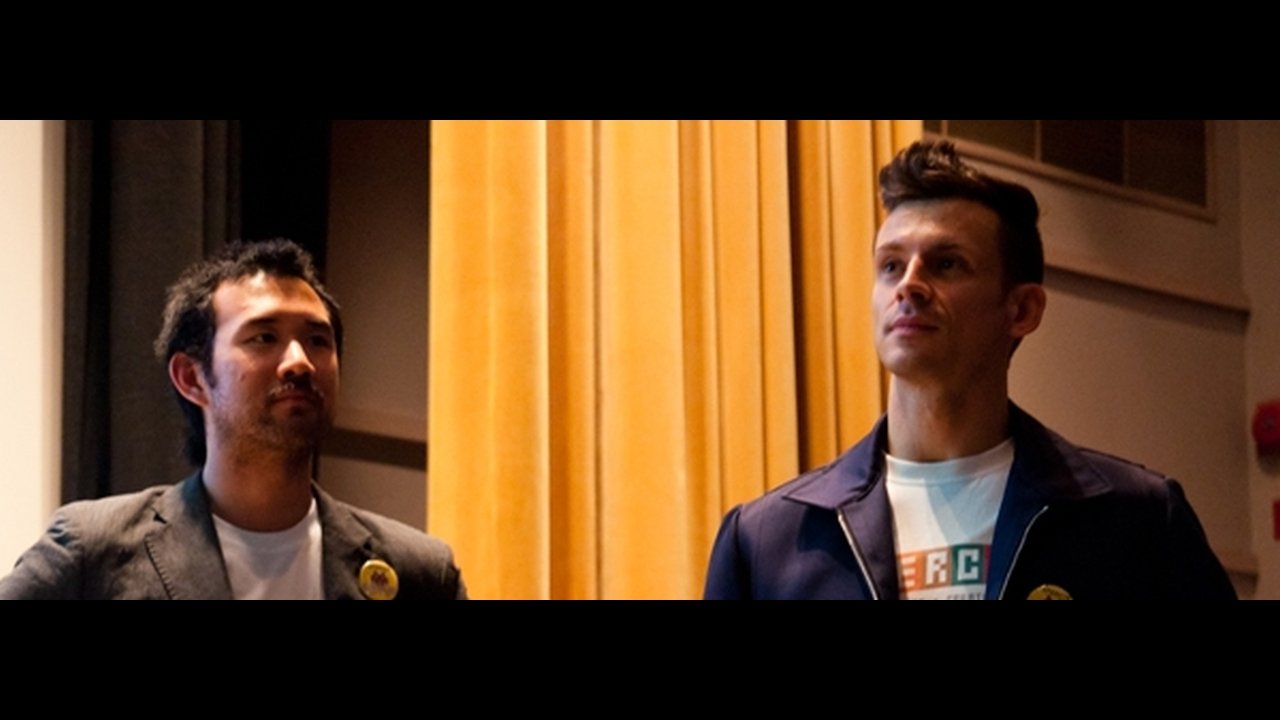Gamercamp may appear to be a lot like any other gaming event you’ve been to with developer presentations, panel discussions, and – of course – games, but it may ultimately have more in common with a fourth grade slumber party than with PAX.
The final day began with pajamas, a few dozen boxes of sugary cereal, and Pinky and the Brain, and the laid back atmosphere makes for one of the most refreshing weekends on the calendar.
So what makes Gamercamp different? According to co-founders Mark Rabo and Jaime Woo, it’s all about tapping into people’s shared love of gaming and providing a forum that allows them to express their passion without worrying about the business trappings that can make entertainment feel like a chore.
With Gamercamp Lvl. 2 in the books – this year’s event ran from November 13-14 at the Toronto Underground Cinema and George Brown College – and Gamercamp Lvl. 3 and the inaugural Gamercamp Jr. on the docket for 2011, we took the time to talk with Rabo and Woo about Gamercamp and the current state of design. What follows is a candid conversation about creativity, community, and the future that also gets closer to the spark that makes Gamercamp so memorable.
Comics & Gaming Monthly: Let’s start simple. Why did you decide to create Gamercamp, this two-day event dedicated to gaming?
Jaime Woo: Mark and I talk about games in the same way that a lot of film enthusiasts talk about film, not just about how good the film was, but what does the film mean to us and why do we respond to it? We feel the same way about games. Why do we play this game? What was great about it? What was frustrating about it? And we wanted more of that discussion because so often we say something is good or bad and leave it at that. So that’s basically when Gamercamp started. We were like – there must be other people who are similar to us, that love games in this experiential way, and we wanted to create an event that allowed all of them to come together and see what was happening.
Mark Rabo: It was just a very relaxed place where people would come and play together. You get folks that are huge game developers hanging out with up-and-coming people that want to get into the industry. You never know what happens when you put people together in the right context.
JW: Gamercamp is for people who like to play games and who have ideas about games. What’s really neat is that people become so inspired that they are interested in getting involved in some way, whether it’s making a game, adding to the critical discussion of games, or even just supporting games. That’s vital for the community. We heard that there was someone who came to Gamercamp and instead of sleeping programmed all the way to Monday because they were so excited about doing stuff. That’s pretty cool.
CGM: Where does Gamercamp go from here? Right now, it’s a Toronto event, but it seems like the sort of thing that people in other cities would love to experience.
JW: This is something that Mark and I have talked about, because it’s something that we love to do and it’s obviously something that we want to share. At the same time, we are only in year two. Fourteen months ago the first Gamercamp hadn’t even occurred. There’s always a danger of expanding too quickly and losing resources.
MR: If you look at any festival that started from the grassroots and then got bigger, eventually it gets to a certain size and has to adapt to a certain form. With the second Gamercamp, we had almost 400 people but we could still have one space. As soon as you start getting into higher numbers, it gets harder to find a venue that holds all of those people. So I guess what I’m saying is that first and foremost, the experience is what’s important to us, and if it means not growing as quickly or maybe not growing past a certain point, then that’s our priority.
JW: It’s not to say that we wouldn’t want to see this kind of enthusiasm in other cities, but the thing is, both Mark and I are from Toronto, so we know the locales here better than we would in other places. Where is the Toronto Underground Cinema of another city? Where is there a supportive environment like George Brown in other cities? That’s very important to us, but it isn’t easy to translate across different places.
CGM: So you’d want to make sure you could still have casual activities like the cereal breakfast before you start looking at other locations?
MR: Creativity is all about letting your guard down and exploring and feeling free to make mistakes. When you have a very serious atmosphere, people don’t let loose, people wait to have the right answer or they don’t say anything at all. I can’t think of anything less serious than watching cartoons while eating a bowl of cereal. That sets the tone for the day and makes it easier to meet people and talk about anything.
CGM: You’ve mentioned community a few times now, but – as much as we’d hate to admit it – gamers don’t always have the most tolerant reputation. How do you reconcile some of the confrontational stereotypes about Xbox Live or Internet forums with the open dialogue you’re trying to encourage?
JW: I think that with Xbox Live, you are hearing younger players who are disembodied from the people they’re talking to. We make that concerted effort to be inclusive. It’s so important to counteract that negativity and that kind of…segregation…that can happen online. As adults, we say, “That’s not what we value.” We value inclusivity, we value diversity, we value many different kinds of people coming together, and being cool with each other. [Pauses.] I feel like I need to stand on a soapbox while I’m saying this [laughs].
MR: I think events like Gamercamp will slowly start to change the perception that people have of gamers. In a lot of the interviews we did, when they said the word ‘gamer,’ they thought of it as a single type of person. We would tell them about Gamercamp, they’d be like “Oh wow, that doesn’t sound like Gamers.” They only hear about the negative stuff. The kids sitting in front of the TV wasting their time, or skipping school to play video games and all this stuff that seems like not a good idea. But just like there’s a lot of different types of moviegoers or music lovers, there’s also a lot of different types of gamers.

JW: It does seem like a mainstream media thing, though, doesn’t it? The perception of ‘gamer?’
MR: Absolutely. We talked to a lot of mainstream media that weren’t into games, that didn’t have any sort of gaming background, and stereotypes were alive and well, for sure, so we’re hoping to change those over time.
CGM: Most of the weekend’s presenters were part of the indie community here in Toronto. Would you ever consider inviting more recognizable developers to the stage, or would you rather showcase indie developers?
JW: We are fans of ideas, so we tend to go towards games that display them. Not to say that some mainstream games haven’t been great. I really enjoyed playing Heavy Rain. I thought they were trying to do a lot of interesting things. The problem is mainstream gaming is a business and there’s an assembly line of games. Those aren’t necessarily filled with ideas that would hold the interest of 400 people in a room. There are games out there that come from the mainstream that are chalk full of ideas. Something Sid Meier – not to say that Sid Meier would come to Gamercamp –
MR: You never know Jaime.
JW: Fair enough. But a Will Wright. The ones who have ideas and have a real point of view in what they do. We don’t want someone who was just a part of the game and can speak as a spokesperson. We want someone whose point of view is established in the piece of work they’re showing, because those people can wholeheartedly speak about what they’re doing and they can tell you where their participation in it was.
MR: It just so happens that in indie games the creativity and the artistry is extremely high because there are only a handful of people working on these titles and whatever they decide, goes. As you get into the larger scale there’s more bureaucracy and there’s other considerations like money and marketing and timing that will affect the creative process. And so there’s no reason that we couldn’t have larger games playing. Some of the guys that are doing some incredible work – Will Wright, Peter Molyneux, Sid Meier – these guys started small, started as individuals, and because they did so well and were so creative and pushed the form so far, they earned the right to have big budgets and express their ideas on a different scale.
CGM: Does that personal connection increase people’s appreciation of the material? What do you want people to take away from these presentations?

JW: It’s funny that video games are these interactive, two-way media that you can interact with and yet there isn’t that same kind of interaction with the people. We sometimes liken Gamercamp to DVD commentary because it gives people a chance to get to know the people who are behind it. It gets people to fall in love with these games and hopefully gets them to come into the field and create their own games. That’s something that Mark and I are really interested in. I think it’s a way to continue refreshing the community.
CGM: Is that the motivation for something like Gamercamp Jr.?
MR: Gamercamp Jr. isn’t so much about games, necessarily. It’s more about embracing play as an important part of life. Jaime and I both feel very strongly that leading creative lives – creating something where there was nothing before – is extremely satisfying, rewarding, and important for society. So I guess that’s our underlying reason for something like Gamercamp Jr. Video games are something that we love, so it’s natural to try and get kids creating video games, because it’s one of the most expressive mediums out there right now.
JW: In school, kids are taught to write, or they’re taught musical instruments, or they’re taught to paint, and this medium, video games, allows them to have all of that put together. The kids can feel like they can make those games. So many times, people don’t write because they’re afraid that they can’t get published or that they might not be good enough, but at the end of the day they should just be writing because they love the act and it’s a way for them to express themselves.
MR: When I was 12 years old, there was nothing like Gamercamp and it was very hard to find people actively encouraging creativity, especially around video games. I think I would be in very different places if we had been exposed to something like that at that early age. So we’re excited to see what happens. You never know. Jaime and I will be old and grey and we’ll hear about these new game designers that credit Gamercamp Jr.
JW: [laughing] We wouldn’t even have to be old or grey, because if these kids are twelve, by the time they’re 18, they could be coming up with stuff. That’s the other thing Mark and I have talked about. Everyone’s first game is crude, so why not have kids create their first game while they’re younger? Who knows what amazing things can happen when we encourage them to start young and get through all of that trial and error earlier. Right? I mean, if Mark and I were trying to make games now, our first games would still be crude, but it would take so much longer for us to create something financially viable before we’re old.
MR: I’m a lot older than you, Jaime, so…
JW: Didn’t they still use typewriters to make games?

MR: [laughs]
JW: One more quick anecdote. As a kid, Final Fantasy 4 was instrumental in me falling in love with games because the story was so immersive and it dealt with love, and life, and death, and sacrifice, and I wanted to make a game like that, but I didn’t know how because there was no course of action. So I ended up trying to do screenwriting, because I figured that if I could write a film, maybe they would see that I was super talented and they’d maybe let me write a game. From there I moved to writing for TV, and then I became a journalist, and then…it was this weird path that I took down that line to where I am today, and it all started because I played Final Fantasy 4. So now, with the kind of life that I live, it’s funny to go full circle and do Gamercamp Jr., having realized that everything that I’ve fallen in love with started with games.



